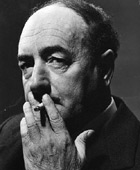Salvatore Quasimodo (1901-1968) was born of Sicilian parents in Syracuse. Desiring to become an engineer, he attended technical schools in Palermo and later enrolled at the Politecnico in Rome. In addition, he studied Latin and Greek at the University there. However, for economic reasons he was unable to complete his studies. He obtained a position with the Italian government's civil engineering corps and was sent to various parts of Italy. In 1930 he had three poems published in the avant-garde review, Solaria, and later that same year appeared his first book of verse, Acque e terre (Waters and Lands). Two years later he published Òboe sommerso (Sunken Oboe), in which he proves a more mature poet. The "poetica della parole", the poetics of the word, which is, for Quasimodo, the fundamental and virtually limitless connotative unit, pervades his first book. While this concept still serves as the basis for Òboe sommerso, the main interest of this collection lies in the rhythmical arrangement of words around a lyrical nucleus. In both these and his later works Sicily is the constant, ever-present factor.
Between 1930 and 1938, the year he left his government position, he made the acquaintance of many prominent Italian authors and painters. In 1938 he became editor of the weekly magazine, Tempo, and three years later was appointed to the chair of Italian Literature at the Giuseppe Verdi Conservatory in Milan.
During the 1930's Quasimodo was a leader of the "Hermetic" school of poetry; however, with the appearance of his translations Lirici Greci (Greek Lyrics), 1940, it was obvious that his direction was no longer entirely along the lines of that group. In Nuove Poesie (New Poems), 1942, Quasimodo reveals both the influence of classical stylistics and a greater understanding of life in general. His subsequent translations, which range from the Greek and Latin poets (Sophocles, Aeschylus, Euripides, Ovid, Vergil, etc.) to Shakespeare and Molière and twentieth-century writers (Neruda, e.e. cummings, Aiken, etc.), reflect his full appreciation of the original works as well as his modern taste and sensibility.
During the Second World War Quasimodo experienced the need of the poet to feel one with the people and to declare himself as such in his poems. To him the role of the poet in society is a neccessarily active one; he should commit himself and his talents to contemporary struggles. Such views were first expressed in Giorno dopogiorno (Day after Day), 1946, and La vita non è sogno (Life Is Not a Dream), 1949.
Quasimodo's later works show this change from individualism toward sociality, and moreover affirm the positive characteristics of life even in a world where death is an omnipresent fear. In La terra impareggiabile (The Incomparable Earth), 1958, Quasimodo has eloquently attempted to fuse life andliterature; he has developed a new language which coincides with man's new activities and ever-expanding investigations. Some of his poetry and two of his critical essays have appeared in English translation in The SelectedWritings of Salvatore Quasimodo (1960); his Selected Poems were published in 1965.
The recipient of many literary prizes - in 1953, for instance, together with Dylan Thomas, he was awarded the Etna-Taormina International Prize in Poetry -, Quasimodo died in Naples on June I4, 1968.
Source: http://nobelprize.org/ |






